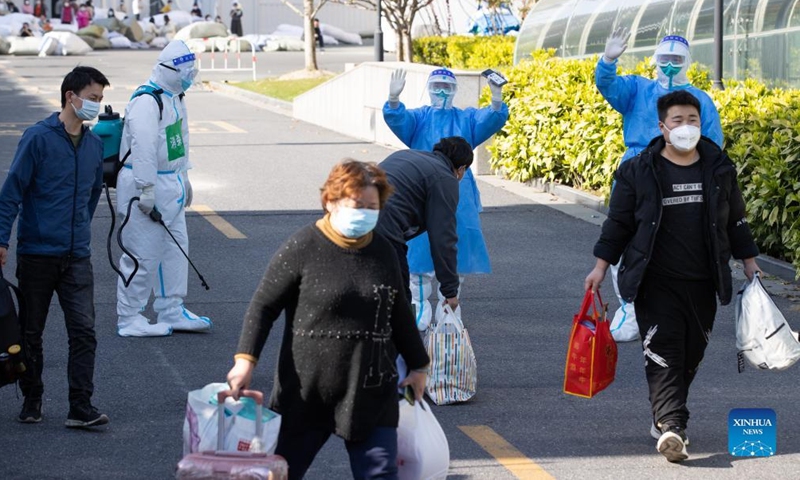IN-DEPTH / IN-DEPTH
What recovery from COVID-19 looks like and what are the long-term effects? Chinese patients share their stories of long COVID

Patients who have recovered from COVID-19 leave a makeshift hospital converted from Shanghai Convention & Exhibition Center of International Sourcing in Shanghai, East China, April 9, 2022. Photo:Xinhua
Editor's Note:
As a latest Chinese study reveals half of COVID-19 patients that were hospitalized still presented symptoms two years on, updates on the status of domestic COVID-19 survivors in the Chinese mainland are back in the spotlight. Global Times reporters recently talked to some recovered COVID-19 patients with severe and mild illness from the earlier wave in Wuhan, in 2020, and the recent outbreak in Shanghai.
Some patients are still living with the aftereffects and reported symptoms on long COVID that include shortness of breath, debilitating fatigue or malaise, elevated heart rate, light sensitivity, exercise intolerance and insomnia among others. Meanwhile, others suffered more psychological consequences and other barriers after going back to work. Patients with mental health issues in some cities are receiving mental health assistance.
It is still too early to tell how long COVID will play out for their rest life. But here is a look at what they are experiencing so far which enables us to learn more about challenges that most likely lie ahead, and more importantly, to better understand China's firm policy to protect people from infection.
However, experts caution against exaggerating or over worrying about long-term effects, as most of them, especially in mild cases, seem to be reversible with active exercise.
Post-illness symptoms reported
The longest tracking study by Chinese researchers, recently published in The Lancet, suggested that more than half of the patients hospitalized with COVID-19 still have at least one symptom two years after they were first infected. The study notes that recovered hospitalized patients still tend to experience weaker health and quality of life than the general people, while their physical and mental recovery keeps improving over time.
The study evaluated the health of 1,192 participants with acute COVID-19 treated at the Jinyintan Hospital in Wuhan, China, between January 7 and May 29, 2020, after six months, 12 months and two years. The results show that fatigue or muscle weakness were the most often reported in long-term effects.
Regardless of the severity of their initial illness, two years later, one in 10 patients had not returned to work.
COVID-19 patients were also more likely to report a number of other symptoms including joint pain, palpitations, dizziness and headaches, the study noted.
Lu Jun, doctor of the emergency department of the Tongji Hospital in Wuhan, was the first infected medical worker in the city during the outbreak in 2020 who became critically ill.
Lu started to present fever and exhaustion on January 5, 2020 and spent more than two months in the hospital receiving treatment.
Lu told the Global Times that he took a latest CT scan in April and the result showed that, compared with when he was released from hospital in March 2020, half of the fibrosis in his lungs caused by the COVID-19 still remained.
In his daily life, Lu said he would feel tired more easily than before COVID. He is also not playing as much sports as before. "In the first year of recovery, I did not try any sports. This year, I have played badminton occasionally. But I have not tried to run far as I do not think I have enough lung capacity for running," Lu said.
As a whole, Lu said he is recovering gradually and his daily life and work has not been largely affected with the exception of the fatigue.
But some patients who were more seriously ill than Lu are not so lucky. Lu mentioned that one of his colleagues, who was more seriously ill, had his lungs and heart damaged by the virus and is experiencing palpitations with his heart rate increasing sharply whenever he does any exercise. For this reason, his colleague was moved to a new position where the work is not strenuous, Lu said.
The 31-year-old fashion designer Zhang Meiting (pseudonym), like many Shanghai residents, did not escape the most raging wave of the epidemic at the end of March. She began to have a fever on March 30 and was transferred to a mobile cabin hospital on April 7. Ten days later, Zhang was allowed to get back home with a negative test result.
"After I came home from the hospital, I started to experience dry mouth no matter how much water I drank. At the same time, I got tired easily. This has never occurred before," Zhang told the Global Times, noting that she is now suffering from persistent and painful joint discomfort.
Zhang said that some fellow patients she met in the mobile cabin hospital also reported fatigue and sporadic muscle pain. Zhang's husband, who also got infected, developed tinnitus after recovery.
Currently, off work at home, Zhang's heart is always on the edge, with a faint and constant pressure, because she does not know how long the aftereffects will last.
But there are many warm things in life at the moment for Zhang to keep cheering up. "When friends and colleagues heard about my diagnosis, most of them expresses their concern. My supervisor has repeatedly asked me to focus on recovery instead of work. They all comforted me a lot," she noted.
Zhang is a firm supporter of China's dynamic zero-COVID policy. "This is an important and timely way to stop loss. The swift spread of Omicron needs to be curbed with precision and speed," Zhang said, considering her example as the best lesson to be learned.
However, some patients with mild illness reached by the Global Times after recovery have not yet revealed any obvious aftereffects.
Annabelle, who was infected in April in the latest wave of the virus in Shanghai, had a high fever for three days, a sore throat and felt cold. But when the fever was gone, the only symptom she experienced was a cough, which lasted for two weeks.
"I have never been vaccinated because I have underlying asthma," she told the Global Times. Instead, she took some Ibuprofen, traditional Chinese medicine Lianhua Qingwen and other pills, and used cold compresses. She also stayed at the Fangcang shelter hospital for a while.
"Luckily, I do not have any sequela so far. Also, when I came home, my neighbors were very nice and friendly and they supported me a lot," she mentioned.
Annabelle said that she will support the "dynamic zero-COVID" policy but she believes the policies could be more flexible in local regions and prioritize people's benefits.
Wang Guangfa, respiratory specialist from the Peking University who contracted COVID-19 after visiting Wuhan in 2020, cautioned against undue panic about long-term effects.
"Strictly speaking, any disease comes with a hangover. Basic diseases and individual mentality also affect rehabilitation. However, most of the sequelae observed from COVID-19 are not organic damage but functional weakening which requires a longer recovery time," Wang told the Global Times.
"Most of the sequelae can be cured with active exercise and an optimistic outlook," Wang said, citing his own recovery lessons.
Hopes remain despite psychological fears
The above-mentioned study shows that COVID-19 survivors reported pain, discomfort, anxiety or depression more often than the control group.
Media has also reported that some early recovered patients face difficulties to reintegrate into society, such as seeking medical care and returning to work, as well as strong guilt about infecting others.
Instead of returning to the office, Yu Xiaojing (pseudonym), a 36-year-old resident of Wuhan who recovered from COVID-19, works from home as her company suggested, after her city lifted the lockdown in April 2020.
"I quite understand the advice and I personally do not wish to pose any threats to my colleagues," Yu told the Global Times, adding that she has been highly anxious about the risk of catching the virus a second time in almost two years since her recovery. "I know how it hurts. It is never like a strong flu," she said.
Yu suffered from insomnia and depression, especially when she heard the news that COVID-19 patients died. Sometimes Yu has nightmares about creatures crawling around inside her body.
Three months after she left the hospital, she quit her job to "avoid any potential discrimination against her."
"I always feel like it was all of my fault that I got my mother infected as well," Yu said. She felt equally guilty when she saw her 68-year-old mother gasping for air.
A psychologist at the Wuhan Mental Health Center told the Global Times that the center's outpatient volume was often "saturated" in the aftermath of the epidemic, with almost half of patients suffering from sleep disorders and various symptoms related to the epidemic. Patients who recovered from COVID-19 and their families are one of the major groups.
On May 11, 2020, Zhongnan Hospital of the Wuhan University opened a psychological clinic for COVID-19 survivors.
Yu realized she might have post-traumatic stress disorder. After over a month of medical treatment and psychological counseling, Yu is gradually shaking off the fear and going back to physical normalcy.
Many COVID-19 patients report long-term effects such as physical discomfort but some are actually caused by excessive mental stress, the psychologist said.
Wang suggested that a positive mindset is crucial for recovery. "The public should have learned more about the potential sequelae, but there is no need to worry too much. Long-term studies are needed to determine follow-up treatment and understand subsequent responses to COVID-19," he said.

